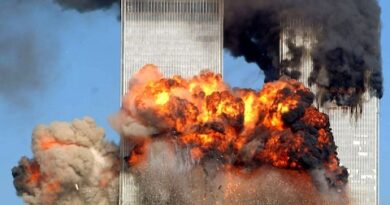Was 9/11 an ‘inside job’?

More than a third of the American public suspects that federal officials assisted in the 9/11 terrorist attacks or took no action to stop them so the United States could go to war in the Middle East, according to a new Scripps Howard/Ohio University poll.
The national survey of 1,010 adults also found that anger against the federal government is at record levels, with 54 percent saying they “personally are more angry” at the government than they used to be.
Widespread resentment and alienation toward the national government appear to be fueling a growing acceptance of conspiracy theories about the 2001 attacks on the World Trade Center and the Pentagon.
Suspicions that the 9/11 attacks were “an inside job” — the common phrase used by conspiracy theorists on the Internet — quickly have become nearly as popular as decades-old conspiracy theories that the federal government was responsible for President John F. Kennedy‘s assassination and that it has covered up proof of space aliens.
Seventy percent of people who give credence to these theories also say they’ve become angrier with the federal government than they used to be.
Thirty-six percent of respondents overall said it is “very likely” or “somewhat likely” that federal officials either participated in the attacks on the World Trade Center and the Pentagon or took no action to stop them “because they wanted the United States to go to war in the Middle East.”
“One out of three sounds high, but that may very well be right,” said Lee Hamilton, former vice chairman of the National Commission on Terrorist Attacks Upon the United States (also called the 9/11 Commission). His congressionally appointed investigation concluded that federal officials bungled their attempts to prevent, but did not participate in, the attacks by al-Qaida five years ago.
“A lot of people I’ve encountered believe the U.S. government was involved,” Hamilton said.
“Many say the government planned the whole thing,” he said. “Of course, we don’t think the evidence leads that way at all.”
The poll also found that 16 percent of Americans speculate that secretly planted explosives, not burning passenger jets, were the real reason the massive twin towers of the World Trade Center collapsed.
Conspiracy groups for at least two years have also questioned why the World Trade Center collapsed when fires that heavily damaged similar skyscrapers around the world did not cause such destruction. Sixteen percent said it’s “very likely” or “somewhat likely” that “the collapse of the twin towers in New York was aided by explosives secretly planted in the two buildings.”
Twelve percent suspect the Pentagon was struck by a military cruise missile in 2001 rather than by an airliner captured by terrorists.
University of Florida law professor Mark Fenster, author of the book “Conspiracy Theories: Secrecy and Power in American Culture,” said the poll’s findings reflect public anger at the unpopular Iraq war, realization that Saddam Hussein did not have weapons of mass destruction and growing doubts of the veracity of the Bush administration.
“What has amazed me is not that there are conspiracy theories, but that they didn’t seem to be getting any purchase among the American public until the last year or so,” Fenster said. “Although the Iraq war was not directly related to the 9/11 attacks, people are now looking back at 9/11 with much more skepticism than they used to.”
The Scripps Survey Research Center at Ohio University has tracked the level of resentment people feel toward the federal government since 1995, starting shortly after Timothy McVeigh bombed the federal building in Oklahoma City. Forty-seven percent then said they, personally, feel “more angry at the federal government” than they used to. That percentage dropped to 42 percent in 1997, 34 percent in 1998 and only 12 percent shortly after 9/11 during the groundswell of patriotism and support for the government after the attacks.
But the new survey found that 77 percent say their friends and acquaintances have become angrier with the government recently and 54 percent say they, themselves, have become angrier — both record levels.
The survey also found that people who regularly use the Internet but who do not regularly use so-called “mainstream” media are significantly more likely to believe in 9/11 conspiracies. People who regularly read daily newspapers or listen to radio newscasts were especially unlikely to believe in the conspiracies.
“We know that there are a lot of people now asking questions,” said Janice Matthews, executive director of 911Truth.org, one of the most sophisticated Internet sites raising doubts about official explanations of the attacks. “We didn’t have the Internet after Pearl Harbor, the Gulf of Tonkin or the Kennedy assassination. But we live in different times now.”
The survey was conducted by telephone from July 6-24 at the Scripps Survey Research Center at the University of Ohio under a grant from the Scripps Howard Foundation. The poll has a margin of error of 4 percentage points.
*** This article has been archived for your research. The original version from seattlepi.com can be found here ***

